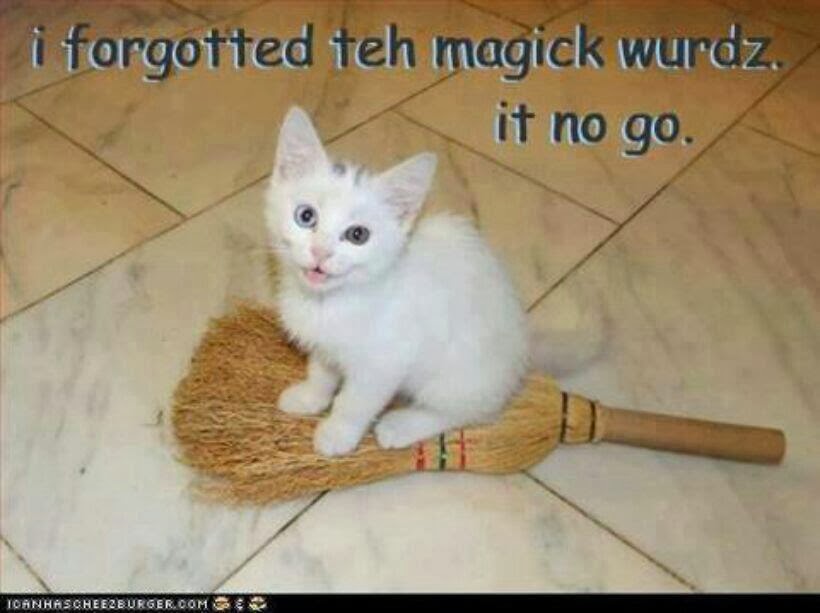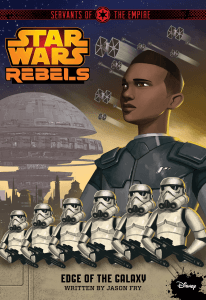Review: Servants of the Empire: Edge of the Galaxy by Jason Fry (or, Imperial Hogwarts)
Edge of the Galaxy, by Jason Fry, is the first book in the new series ‘Servants of the Empire’, and it can easily be summed up in one simple phrase: ‘boy realises Empire is evil’. I can go home now, right? I mean, once that’s done I can stop? Probably best to write a little more. It’s a review, after all. I could probably also add a ‘duh’ on the end of that five word sentence, because really? It’s the Empire! They march around in faceless white armour and dull grey uniforms and ride in fighters that make incredibly annoying screeching sounds that probably causes dogs (space dogs?) to bury their heads in a baby Sarlacc pit. And really, you know something is evil when it upsets dogs, because they’re nature’s Sniffer Outer of Evil.
Yes, that’s totally a thing.
This is what the book is about: people who genuinely believe that the Empire is, ultimately, good. Maybe a little flawed, but good. Before I go further, I should point out that there are minor spoilers for the book and the TV series Rebels from here on out.
King Arthur is actually evil! Childhood. Ruined.
The story revolves around Zare Leonis (he’s the one in the spiffing cadet uniform, staring heroically off into space). You may recognize him from the Rebels episode Breaking Ranks. He’s the one who helped Ezra in his attempt to undermine the Empire, and who stays behind at the end, because he wants to find out what happened to his sister, who had disappeared some time ago. This book is set in the year before that episode. So I think you know what the plot might be about.

The book starts with Zare Leonis and family newly arrived on Lothal and celebrating the acceptance of Dhara Leonis (Zare’s sister) into the Imperial Academy. Dhara leaves, and Zare is left alone to wait an entire year before he can join her at the academy. In the interim time he must attend a local school – and that’s it. Oh, there was that thing about realizing the Empire is evil, but that pretty much is it. So let me talk about what it isn’t: it is not an action story. There is exactly one action scene. And, to be honest, I wasn’t that big a fan of it. Not so much because it was badly done or felt out of place – on the contrary, I thought it was a natural progression of Zare’s rebellion against the Empire. But I didn’t like it because of what happens after: very little. Zare didn’t react at all at the prospect of having potentially killed someone (from the writing it’s not clear if he did, but the intent behind his actions was. (By the way, the book is intended for 6+ readers. If you’re worried about that sort of thing, it wasn’t particularly graphic.) This went unremarked by him, whereas I would have expected at least some emotional fall out. Unless, of course, he’s a psychopathic murderer.

What we do get is a story about a person who loves the Empire, and wants to serve the Empire until the end of his days. Which, given it’s set five or so years before the films, is probably not that long.

And this is something that I very much enjoyed. From personal experience, the only times the Empire’s been spoken of as a force for good is done, not by ordinary citizens, but the baddie. This is a clever distinction, because not all Imperial citizens are evil. Not even the ones actively working for the Empire are evil – Zare’s parents happen to be two such people. As Zare starts to turn away from Empire-lovin’, it’s these two who are given the chance to provide an alternative perspective with their particular brand of Imperial apologetics, apologia and whatever other apo- they can think of.
It was a deft touch by Fry to make Zare’s parents not just the apologists, but people who actively work for and help the Empire. This makes them the privileged class in the Empire, the ones who are most likely to benefit from the continuation of the organisation, the ones who are, most likely, not going to suffer at its hands, and those who are in a position to not see the dark side of the Empire, and what’s more have the privilege to be willfully blind to it, too. This point is highlighted to Zare later by a friend when she points out that she and Zare are destined for important roles within the Empire, while their classmates are destined for low-paid labour. Great idea by Fry (or whomever it was that came up with it, if not he).
Zare himself starts to learn of said dark side at his school. Which, by the way, has more than a few parallels with Hogwarts. I’m not even kidding. Zare has two friends, one of which is a Hermione-like know-it-all named Merei. Zare even signs up for, and leads, the school Grav-ball team. (Grav-ball is a game much like American football, but with a three metre-wide hoop as a goal. Yeah, you can be forgiven for thinking of Quidditch. I half expected Zare to hop on a broom and seek the golden snitch.)

Grav-ball is one of the areas that Zare realizes that life, and the Empire, isn’t fair. The sports director, Fhurek, is quite xenophobic, and seeks to expunge all aliens from the team. I won’t go into too much detail, for fear of spoiling it entirely for you, but I will say that I think Fry handled this brilliantly. He didn’t settle for ‘Fhurek bad guy, must stop him!’ – though that is essentially the gist – but Fry used it to highlight the consequences, in a realistic manner, what this would mean for a person in Zare’s position.
This is the main arena where Zare comes to terms with the evilness of the Empire (so if you’re not a sports fan you may find this book a slog), but there are others. I mentioned that he has two principle friends at school. The first is Merei, and the other is Beck. Beck goes through his own turmoil as he watches his old farm slowly destroyed by the Empire. Zare is naturally sympathetic to his friend’s despair, and Fry uses this, again quite adroitly, to sow the seeds of Zare’s rebellious intent. Overall, though these attempts to show the Empire Is Bad are occasionally a little obvious, they’re forgivably so, as Fry never overplays his hand and because he takes his time to develop them, and also convey how pro-Empire people see these issues. Which, to me, is the best part. But what is interesting is that, though the sportsball (or whatever it’s called) takes up a lot of page time, it’s this avenue that provides Zare with the most intellectual growth.
As for Zare as a character … well, it took me a while to get used to him. He’s certainly well written and benefits from being, for all intents and purposes, an original character. But he is quite morose. Indeed, as the story progresses he goes from morose to even moroser (that should be a word). Certainly, he does have reason to be, and I did get used to it after a while, but I think I would have taken to him faster, and actually liked him, if we could have seen him as a little more happy or easy-going before everything went downhill. The other characters were very well written, and even very minor ones were well developed. Dhara especially. She was warm, charming, lovable. It was never confirmed that she was Force-sensitive in the TV series, but I could easily see her as a diplomatic Jedi. I sincerely hope that she does turn up later, either in the forthcoming books or the TV series.
In conclusion: As the first in the series, I felt it set up further books admirably and, perhaps more importantly, got me excited for more books in the series – while at the same time maintaining the integrity of the story on its own. One that could be loosely termed as a light political thriller, I’d definitely recommend it.
Star Wars: Servants of the Empire: Edge of the Galaxy by Jason Fry, published by Egmont, is out now in UK bookstores. Thank you to Egmont Publishing for providing a copy for review purposes.
Author: Michael Dare
Michael Dare is a writer, lives in the UK, and has been slowly coming to terms with the realization that he is not Sherlock, but Watson. He loves Star Wars, dislikes blue milk. Enjoys jumping sharks. Survives on the tears of sexist men, and cheeseburgers.

